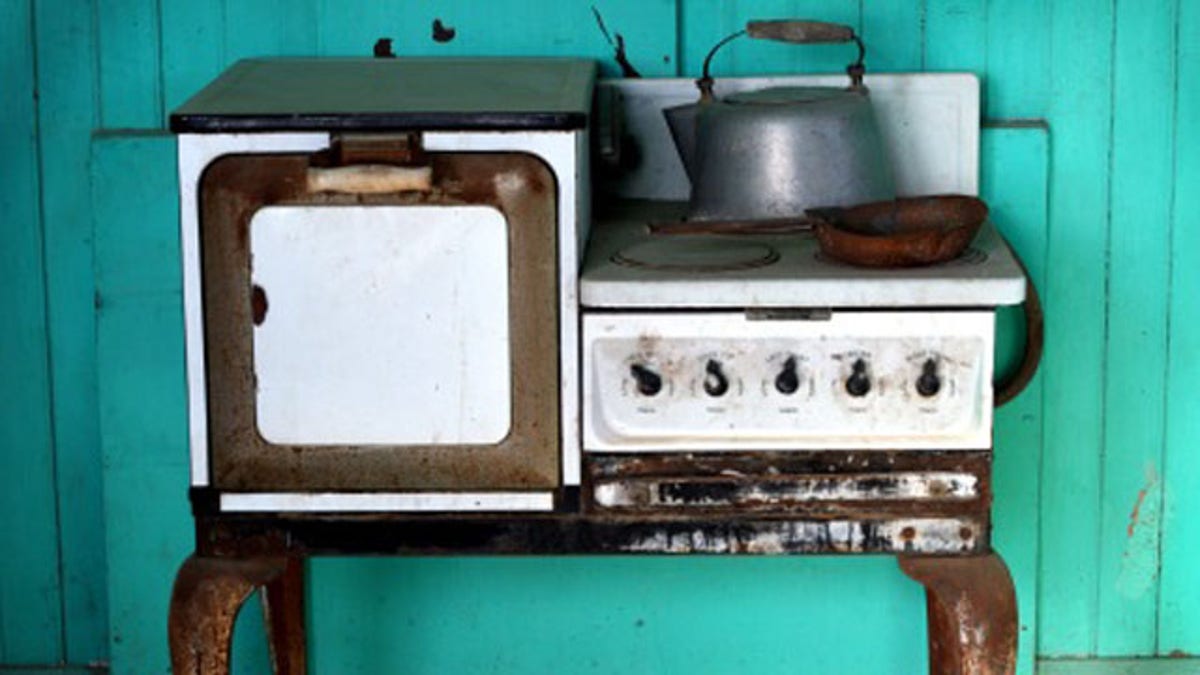
(iStock)
“For the floor that you’re walking on, I chose this Bolivian Wormwood, I think works well in here. I’ve the Viking range here and and the twin Sub-Zs,” says Owen Wilson in "Meet The Parents."
Wilson’s house-proud tour emasculates Ben Stiller and confirms what we all know: that only a massive master-suite with his- and her-bathrooms with heated floors eclipses the status that a fancy kitchen confers.
A decade of cable cooking shows has exposed us to impossibly well-equipped kitchens, engendering national kitchen-envy. Wanting the best is an American trait and we want those kitchens. Kitchens are the new sneakers. Seeing is wanting. It’s not a rational process.
No reasonable person thinks a pair of kicks will make him the next LeBron or even Jeremy Lin. But put a guy behind a Viking stove and he thinks he can be the next Iron Chef. Cooking shows seduce us into thinking we can cook. We forget that those on-air types have years of cooking under their belt, some better (Lidia Bastianich) than others (Paula Deen.)
Here’s the good news. You don’t need a fancy kitchen to make a great meal. In fact, learning to cook in what Chef Jennifer Schaertl calls a “crappy, little kitchen” (CLK) makes you a better cook. Learning in a good one or waiting to learn until you can afford a better one is a cop-out, she says.
Click here for Schaertl's recipe for bolognese.
Learning in a great kitchen is like training for a marathon by running only downhill, she says. “When you actually race, it’s gonna be way harder, despite all that training.” Great kitchens do not great cooks make. Case in point, a Thanksgiving Schaertl spent in New York City.
Schaertl, a former Miss Shiner as in Shiner, Texas, home of Shiner Bock, remembers that Thanksgiving because of a fabulously foul odor wafting from the seriously fabulous kitchen soon after the hostess began pre-heating the oven. A container of dip left in the oven since the Super Bowl had begun melting. “She hadn’t used the oven in nearly a year,” laughs Schaertl.
“If you can read you can cook,” says Schaertl, author of Gourmet Meals in Crappy Little Kitchens. Her proof: an “insanely supportive” mother who doesn’t cook, who tested many dishes and edited traditional “chef-speak” out of the recipes.
Schaertl learned to cook in a typical CLK, a closet-like Brooklyn kitchen with no counters, no dishwasher, a tiny stove and a mini-fridge. It wasn’t masochism. “I cooked because we couldn’t afford to eat out,” she explains. Returning to Texas post-September 11th she switched careers, earning a culinary degree from Dallas’ El Centro Community College.
Click here for Schaertl's recipe for ricotta cheesecake.
Culinary grads, trained on the best equipment, often end up in kitchens held together with duct tape and aluminum foil, without a single Robot (row-bo) Coupe (professional-grade food processor) in sight where they’re like deer in the headlights. She felt right at home. A newbie chef asked her where the juicer was. “It’s your hands,” she said, “and quadruple the recipe.”
CLKs’ lack of counter space complicates recipes, no dishwasher means big clean-up, no equipment means whipping, mixing, chopping by hand. Limited storage limits menu options. It’s not a liability. It’s a challenge. It’s cooking boot camp. Cook there and you can cook anywhere. “You’ll be prepared for the apocalypse,” jokes Schaertl.
Her audience is people who cook in small spaces by necessity (dorms, university housing, small apartments, down-sizing) or choice (boat, RV).
Recipes range from American to Mexican to French to Italian to vegetarian (“from the days I couldn’t afford meat.”) They’re all comfort foods meant to be to be made with just the basics—sauté pan, stockpot, Dutch oven and a well-stocked pantry. She developed recipes like risotto, mushroom tamales, lasagna, curry chicken salad, Shepard’s Pie, from years in restaurant kitchens and scaled them down from restaurant proportions (i.e. the original risotto recipe yielded five gallons).
Click here for Schaertl's recipe for stuffed chicken breast.
These days lamb shank and pot roast-loving Schaertl is the Executive Chef of the vegetarian Premiere Raw in Austin. “I needed a job,” she explains of the culinary 360 to raw food, “but I’ve ended up loving it.” She’s happy because she’s learning. It’s not about fooling people into thinking that her vegetables sliders are better than burgers. “They’re not,” she says, but, they’re “the best vegetarian sliders in Texas.”
At the end of day, as most women will tell you, it’s not the size of the kitchen or how well it’s equipped. It’s what you do in it that matters.
